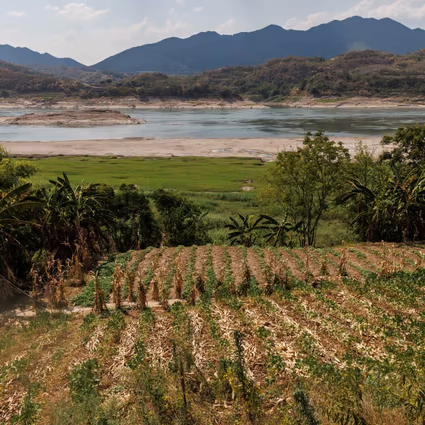It's obvious. We don't have to wait until 2030 to see the effects of the climate emergency. They're happening right now.
Cars. Batteries. Solar panels. Food. Global shortages and soaring prices are almost certain as China's seemingly never-ending heatwave sears on.
It's the most extreme heat event ever recorded in world history. For more than 70 days, the intense heat has blasted China's population, factories and fields. Lakes and rivers have dried up. Crops have been killed. Factories have been closed.
More than 900 million people across 17 Chinese provinces are subjected to record-breaking conditions. From Sichuan in the southwest to Shanghai in the east, temperatures have been topping 40C.
In the Sichuan city of Dazhou, an air raid shelter has been converted into a heat refuge. In Chongqing, subway stations are opening to offer subterranean recovery stops.
But the extreme heat and dry weather are having far-reaching effects.
Energy, water, and food supplies are being hit across the country. Rivers are drying up. Dams are emptying. Hydroelectric plants are shutting down.
That means factories are being closed to divert available electricity towards residential use.
In the fields, crops and animals are wilting – as are their human tenders. Hundreds of thousands of acres have already been seared, with serious worldwide repercussions expected on food supplies and prices – especially vegetables and grains.Signs of things to come
The Sichuan megacity of Chongqing, home to some 30 million people, reached a top of 45C on August 18. On August 20, the city's overnight minimum bottomed out at 34.9C.
These are the highest temperatures China has recorded outside the occupied desert province of Xinjiang.
"There is nothing in world climatic history which is even minimally comparable to what is happening in China," weather historian Maximiliano Herrera told New Scientist. "This combines the most extreme intensity with the most extreme length with an incredibly huge area all at the same time."
Electricity demand for cooling has spiked at the same time production has plummeted.
Not enough water is flowing through hydroelectric power turbines. Nuclear power plants are struggling to keep their reactors cool.
Chinese sources state some 66 rivers have dried up completely. And parts of the critical Yangtze river systems are at a third of their normal levels – the lowest since records began 150 years ago.
This has been a particular problem in Sichuan province. It gets some 80 per cent of its electricity from hydropower. Now thousands of factories have been ordered to close. Offices and shopping centres have been instructed to cut lighting and set airconditioning temperatures higher.
But the effect of low water levels extends far beyond this.
Shipping cargo routes are blocked. Long-lost Buddhist statues are being exposed among the drying mud. And drinking water is being rationed.Supply chains broken
Among the global corporate players affected by the Sichuan shutdown are car manufacturers Toyota, Volkswagen and Tesla. It's home to major Intel and Apple assembly plants, as well as the world's largest battery maker, Amperex Technology. The region is also a significant producer of the globally critical mineral lithium and polysilicon solar panels.
Toyota has reportedly resumed some production by acquiring a large-scale diesel generator. But, in Shanghai, Tesla has been forced to appeal to local authorities to be exempted from power restrictions to maintain its supply of electric vehicle components.
The trickle-down effects will extend globally.
Lithium prices are soaring: China has long cornered the market.
And many of the technologies needed to combat the climate crisis exacerbating China's woes will now likely become much more expensive and harder to find.
But the most immediate problem will be food.
 |
| Parched crops on the bank of the Yangtze River, which is approaching record-low water levels during the drought in Chongqing. Photo: Reuters |

No comments:
Post a Comment